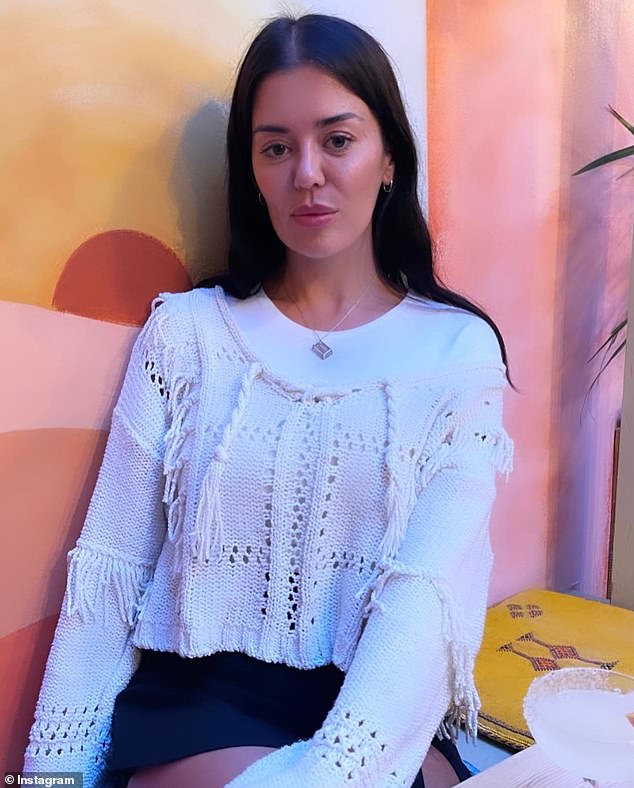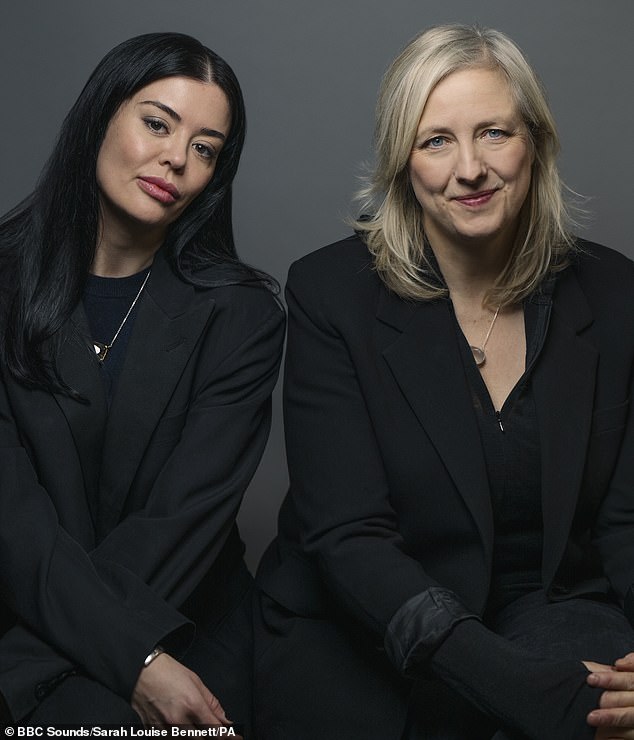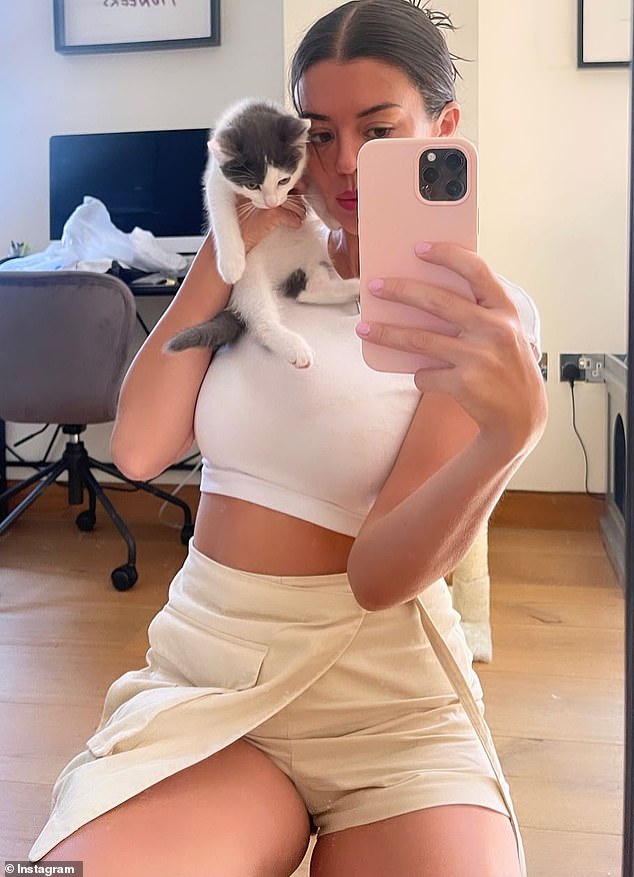A woman who was intensely stalked by a mystery culprit for years has opened up about the sinister moment hackers began targeting her boyfriend and emailing him rape fantasies.
Hannah Mossman Moore had recently graduated from the University of Edinburgh when she was first targeted by hackers, marking the start of a terrifying four-year ordeal that ‘robbed her of her twenties’.
The criminals threatened to destroy her life and relentlessly targeted the jewellery designer. They stole her identity and posed as her to her friends, family and even work colleagues.
They knew exactly when she had changed her phone number and address, sending her parcels full of questionable items such as a packet of Werther’s Originals which had been opened and stapled together, nail varnish, and a menu for a restaurant.
In a bid to escape her stalkers, Hannah moved to Sri Lanka, for the second time, to start afresh when she met her boyfriend Dylan. But it wasn’t long until he was also targeted.
Emails with the subject line ‘Warning, careful of Hannah Mossman Moore’ would fly into his inbox almost every day, along with ‘About Hannah and be warned,’ as well as ‘Caution from this woman!’
Dylan was invited on the BBC Sounds podcast, Stalked, where he and Hannah opened up to journalist Carole Cadwalladr about what they had experienced.
He said the hackers got into his business email, before moving on to his personal email address, adding: ‘I really have no idea how [they] got into my personal email. [They] made some derogatory comments. At one point [they were emailing me] almost every day or every other day over a period of three to six months.’

Hannah Mossman Moore (pictured) had recently graduated from the University of Edinburgh when she was first targeted by hackers
Some of these sickening emails would contain rape fantasies involving Hannah, along with other false information such as ‘She took money from me and we had sex.’
Dylan said the hackers were out to ‘sabotage’ anything Hannah wanted to pursue, forcing the couple to explain their complex situation to business contacts, including hotels that were stocking her jewellery.
The communication became increasingly more threatening, with the sender implying they were nearby and watching her. These included: ‘Hi Hannah Mossman Moore, I finally saw you. You look good in blonde hair.’
‘I will come and get you,’ another read. ‘There is so much to learn when one just follows you around,’ said another.
Hannah said: ‘[They] knew exactly what I was up to. My friend had a nail salon and I got my nails painted there black and white and [they] were like “nice black and white manicure”.’
Dylan said the stalker would ‘keep track of everything’, including her whereabouts, along with everyone she was linked to – which included him.
The pair recalled a time they were at a Halloween beach party and were sent a zoomed in picture of Hannah.
Hannah said: ‘[They] sent a picture zoomed into my chest. That picture didn’t exist on the event photos. And I still, to this day, have no idea where he got that picture from. [They] would say “I’ve got spies and microphones watching you from every angle”.’

Hannah and Dylan spoke on the BBC Sounds podcast, Stalked, alongside journalist Carole Cadwalladr (pictured right), who is also her ex-stepmother
Dylan added: ‘There was a point where Hannah didn’t even want to look outside the window. It was heartbreaking knowing she’s living grappled with fear.’
The same anonymous account then started emailing Hannah and telling her that they were going to set her up as a sex worker. It wasn’t long before another email address started getting in contact with Hannah called Premium Escorts.
The account would email her around five times a day with misogynistic language, asking her how the experience with their ‘client’ was and even claimed she was being filmed with hidden cameras.
Hannah said: ‘They would send me pictures of urine and faeces four times a day. It was so gross and so embarrassing that I was even embarrassed to tell you some of it now.’
Throughout this period, Hannah continued to email Met Police and keep them updated with the messages both she and Dylan were receiving. However, they closed her case on 30 January 2020 due to ‘evidential difficulties’.
She told Carole, who is also her ex-stepmother, about the online harassment she had been facing in lockdown and the BBC journalist was able to hear the emails come through in real time.
Hannah suspects a man she had met at London Fashion Week in 2015, Hong Kong- born Kin Hung, was behind the harassment.
However, when approached by the BBC, Kin said he denies the claims about him in their entirety and says they are ‘completely false and without any foundation’.

Dylan said the stalker would ‘keep track of everything’, including Hannah’s whereabouts, along with everyone she was linked to – which included him
Hannah met Kin aged 23, when she attended her first London Fashion Week in 2015. She was impressed by his ability to get into VIP events while simultaneously sitting on front row shows alongside big names.
Confident Kin, who was in his 40s when they first met, knew Hannah’s friend and introduced himself to her, claiming to be connected to buyers in Asia. Eager to break into the industry, Hannah snapped up the chance to network further when he invited her to an exclusive salon.
After exchanging details, Hannah and Kin would keep in touch via email, with Hannah saying: ‘I found it comforting to have someone older who knew the industry. I knew he was attracted to me.
‘We really got on, we had a really good connection, we had fun together we made each other laugh and I thought that I could steer that into a friendship.
‘Being an intern for a jewellery brand, you’d be sent out to get the coffee, you wouldn’t be in on the exciting meetings. But all of a sudden, Kin believed in me and wanted to mentor me, that felt really good.’
But, in April 2016, eight months after they first met, an email apparently arrived from Kin’s address but it wasn’t from him. Instead, it was from a person who claimed to be Kin’s girlfriend. Hannah claimed Kin had never discussed a girlfriend and ‘was always free’.
When she went to respond, Hannah claimed she then got numerous other emails from people claiming to be connected to Kin romantically, such as a boyfriend.
Hannah said that Kin told her he was being hacked and to ignore the strange messages she was being sent and they disappeared fairly quickly.

The Met Police closed Hannah’s case on 30 Jan 2020 and said they did not have enough evidence
When she turned 24, Hannah moved to Sri Lanka for the first time after getting another internship at a gemstone company, meaning the pair drifted apart.
But she was forced to return to the UK and give up her job after catching dengue fever, a viral disease spread by mosquitoes that causes flu-like symptoms.
When Hannah was hospitalised, Kin came back into her life, visiting her to check on how she was doing and would even bring her hot chicken soup.
Then, once she had recovered, they slipped back into old habits, attending Armani fashion shows and getting on the most exclusive guest lists.
But in November 2017, Hannah said Kin claimed he was hacked again and she received a bizarre email. At this stage, Hannah was still able to brush it aside: ‘I just thought “Okay he’s a wealthy guy, obviously he’s going to get hacked”. I thought it was hackers.’
According to Hannah, Kin appeared to be stressed out by the hackers and told Hannah that he was going to the police about the issue, adding: ‘Please be assured, I am not hiding anything from you.’
A turning point in their relationship came when Kin invited Hannah on a trip to Florida to go to a swanky Art Basil event.
Hannah – who had known Kin for two years at this point – jumped at the opportunity, much to the dismay of her family, who were growing increasingly anxious about their friendship.
But what should have been an exciting trip to the States filled with networking opportunities turned into a nightmare.
After having too much to drink one evening while on the trip, Hannah passed out in Kin’s car and they drove from one side of Florida to the other.
The pair went from Miami to Naples, back to Kin’s ‘crash pad’, which was in a gated community, and Hannah passed out in the spare bedroom.
When asked if there was ever anything physical between them, she said: ‘There was a couple of times that I was so, so drunk and that’s all I want to say on it but we were definitely not in a romantic relationship.’
The morning after, Hannah said Kin got odd emails from cyber criminals again. He received a message in a group from his sibling which allegedly said: ‘There’s been an emergency, mum’s been robbed, they hit her on the head.’

In the podcast, Hannah (pictured) admitted: ‘I feel robbed of my twenties and I woke up in my thirties like “What’s happened?”‘
Hannah then recalled seeing a large amount of text come through that mentioned ransom and money, which left her feeling shaken. Although they’d had quite a lot to drink, Hannah wanted to return to Miami, which is more than 100 miles away.
Kin told Hannah not to leave, she claimed, and said ‘it wasn’t safe’. When he went out to get water, Hannah said she texted him to say she felt ‘very uncomfortable’ having been left alone and that she was ‘really, really scared’. She then told Kin he was being ‘aggressive’.
In a ‘state of panic’, Hannah said she decided to call the security guards in the gated community but claimed they just ‘laughed’ at her.
She had just enough money for a taxi back to Miami but not enough for somewhere to stay, so she called her brother who booked her a hotel room and stayed with her on the phone until the car arrived.
She flew back to London the following morning, under the impression that once she cut Kin off, her life would go back to normal. But the situation only got worse.
Once she was back on British soil, Hannah contacted the Miami police department and they assigned a case number. However, she told the BBC that they told her it was a matter for the UK force to deal with and she never heard from them again.
Hannah claimed she then started receiving messages from Kin, to which she responded: ‘I am respectfully asking you to stop contacting me.’
However, she said he claimed he had staged a fake argument so that the hackers would think Hannah was out of his life, thinking that she would be safe and they would no longer contact her.
Kin apparently said he had flew to cybersecurity company Capgemini in London, with the intent to shut it down for good. However, when the BBC asked Capgemini about the case, they said they could not find any client records under the name Kin Hung.
To be sure, producers also gave the names of Kin’s companies and companies he had a connection to, in case he had used those. But Capgemini asked their finance team, who said none of those were clients either.
In early 2018, after their trip to Florida, Hannah said she received strangely worded emails from Kin, asking her to give back the furniture he had gifted her when she moved into her flat in London.
However, Kin’s message also apparently said that Hannah owed him money. She repeatedly attempted to set up a drop off of the goods by asking for his address, all while stating that she owed him nothing.
However, Kin wasn’t listening and allegedly continued badgering her for the furniture without providing a solution to the situation.
But when she sent yet another message, she got an automated response which said that he hadn’t had access to his emails since January 5, 2018 when the cyber criminals took control of his account.
However, this is when the messages became increasingly more targeted towards Hannah and her life got turned upside down.
A new anonymous person started contacting her from another email address, thanking Hannah for signing up to the ‘online reputation management services’.
The email contained her full name, date of birth and genuine private details about Hannah and her family. It stated that payment would now be taken from the bank details on their records. Hannah said: ‘It was really scary and they were so good at it.’
Hackers would also constantly harass Hannah, bombarding her phone with calls to the point where she would pick up and yell: ‘What do you want?’ But the caller would remain silent for a couple of seconds before the line went dead, recalled Hannah.
She kept changing her phone number in a bid to get rid of the stalkers, but they would keep returning. ‘They would send the email and then something would happen in real life,’ she said.
Hannah elaborated and said they would send details to her about her phone contract and then the hackers would deactivate her number.
And when she called her phone company to ask what had happened, they’d simply say that she had reached out to them from an email which was Han, followed by her birthday, @gmail.com, asking them to shut it off.
They then started targeting her father, deactivating his mobile on Father’s Day.
By age 26, Hannah went phone-free in an attempt to enjoy a more peaceful life where she couldn’t be harassed online. While emails continued to come through, the stalkers had moved on to sending Hannah physical mail to her address.
Parcels would come to her door, with different versions of her name each time. Speaking about the few she did unwrap, Hannah said she once found a Werther’s Originals which had been opened and stapled together along the seal, nail varnish, and a menu for a restaurant.
‘It started to really bring me down,’ she said. ‘I would often get ready to go out and then panic and then delay and delay and then end up not going out. I started to overthink what to say when people asked how I was.’
Hannah then moved back in with her father, Dave. He said: ‘She started hanging out with me, almost clinging to me actually and I thought, she really needs me.’
But the torment didn’t end, as the day after she moved, the sinister parcels started arriving at her new address. She would also get emails from people posing as her father, attempting to trick Hannah that he was hurt.
Another email from a hacker said: ‘What you’ve seen so far is nothing, just a teaser to warn you what could happen so don’t push us. This is between us two and nobody else.’
They then gained access to her social media accounts and posed as Hannah on WhatsApp groups with her friends, family and with her old work colleagues. She wasn’t aware this was happening at first.
It caused her to get anxious about meeting up with her own friends and would often turn down parties to the point where she didn’t get invited anymore.
Hannah said: ‘I was absolutely exhausted and at the end of my tether. I just wanted it to stop. It also terrified me – if someone is going this far, I was thinking, f***, what’s next.’
She said she didn’t know how to tell her friends what was happening, as she didn’t know what was happening herself.
She noticed that a lot of the emails had a similar theme – many of them were fixated on her former employer, a small jewellery company she’d worked for after her internship with Alighieri.
Hannah went to the police station and reported her crimes, telling the force she suspected it might be Kin.
The Met Police officer on the case emailed her and said: ‘I have issued a warning letter to the suspect stating that if any contact is made with you, he will be arrested for harassment.’
After warning Kin about his alleged behaviour, the Met told Hannah they were also going to try and arrest him, telling her: ‘He has been circulated as wanted and therefore this will flag up when he flies in or out of the country.’
Weeks went by and Hannah continued to hear nothing from the police, until they told her that they went to an address in central London in the early hours of the morning as they believed Kin might be there.
But the Met said: ‘There was no answer and the house was in darkness. We were unable to locate him in the UK due to his transient international lifestyle.’
A couple of months later, on 30 Jan 2020, they closed the case and said they did not have enough evidence.
It later emerged that while he was wanted by police, Kin was playing tennis in plain sight in front of spectators at the prestigious Hurlingham Club.
The Met’s case file stated: ‘We do not have evidence that it is in fact the suspect that has sent these, the emails emanate from various accounts. Significant work would be required in order to try and establish where these emails originated.’
Hannah said: ‘The powerlessness of this is the worst thing.’ She added that she suspects that Kin may be behind it, despite sympathising with the situation and telling her how ‘awful’ it was that she was experiencing this too.
Within a month of Hannah forwarding an email chain about plans for the BBC podcast series, the final emails from the Premium Escort Service finally stopped.
In the podcast, Hannah admitted: ‘I feel robbed of my twenties and I woke up in my thirties like “What’s happened?”‘
Carole eerily warned on the BBC’s production: ‘Whoever’s behind this campaign knows a lot about Hannah. And they may even be listening to this podcast.’
Podcast co-producers Georgia Catt and Rob Byrne gathered all the evidence that Hannah kept over the past four years and gave it to Jonathan Sebire, a data expert who works for Premier League clubs, identifying and managing threats against footballers.
He examined the trail and was able to reveal a pattern linked to Kin’s movements, noting that the IP addresses were coming from the UK, Europe and Hong Kong, where Kin is originally from and would visit.
Kin has only responded to claims about him to the BBC through his London-based lawyers.
Reflecting on what happened to her, Hannah said: ‘I made so many bad choices. I accepted so many free dinners from Kin and I thought he could mentor me, I enjoyed the life and the free stuff but that doesn’t mean I deserve the hacking and the stalking.’
Hannah said she felt ‘responsible’ when she started seeing those closest to her get targeted by the hackers.
As the BBC continued to dig into Kin’s history, they found an address in Surrey that he is linked to and decided to visit. The journalists found the Land Registry for the property, which states that he is the co-owner of a two storey house which was described as ’empty, with moss growing on it’.
This is a far cry from the properties that Kin claimed he owned, which included a penthouse apartment valued at £113million, which had views over Hong Kong.
The BBC also found that the run-down Surrey property had an interim charging order, meaning in the event of a sale, he would have to pay off a debt to the local council. However, they were not able to find out how much the debt amounted to.
The news outlet also claimed that Kin had to pay a £3,000 settlement after being sued over unpaid legal fees involving one of his UK based businesses that has now ceased trading.
Producers Georgia and Rob decided to talk to some of Kin’s neighbours who knew him as ‘David’. They described him as a ‘quiet, reclusive man’.
Kin was invited onto the podcast but rejected the offer, telling the BBC through his lawyers that he felt as though he would not ‘receive fair treatment’.
When approached by the BBC for comment, Met Police Commander Kevin Southworth said: ‘We recognise the service the victim received between 2018 and 2020 fell short of what’s expected and we’re working hard to ensure all victims get the support they need and their cases investigated appropriately in every instance.
‘Since 2022, we’ve significantly improved our response to stalking and in the last year have investigated more cases of this nature than ever before.’
If you need to speak to someone, please contact the National Stalking Helpline on 0808 802 0300 or visit the website here












